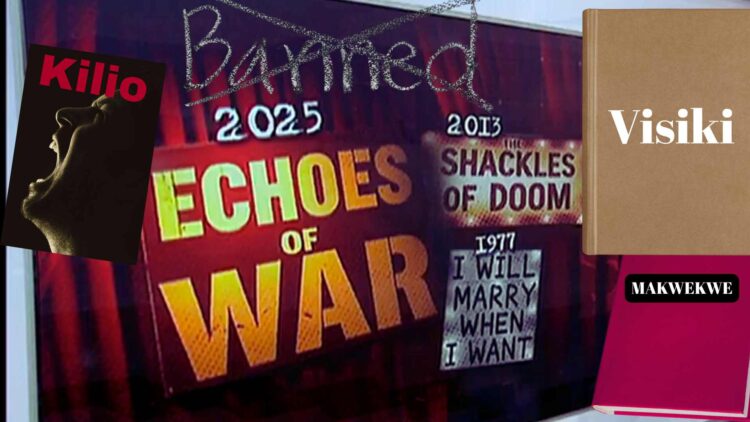‘Echoes of War’ and Other Banned Plays Since Jomo Kenyatta’s Era.
“All the world’s a stage, and all the men and women merely players,” said William Shakespeare in his 1599 play As You Like It, reflecting the power of theatre to mirror society.
In Kenya, this power is often met with resistance, as seen with Cleophas Malala’s controversial plays over the years. His recent work, Echoes of War, follows a long history of performances that have faced similar fates of censorship and suppression since the era of President Jomo Kenyatta.
The Shackles of Doom: A Precedent Set
Twelve years ago, Malala penned The Shackles of Doom, a gripping 48-minute play that created waves across the nation. Set in a fictitious community called the True People of Kana—an apparent reference to the Turkana people—the play explored the exploitation of indigenous communities by wealthy elites.
In the play, the dominant tribe, having acquired the land of the True People of Kana, built an oil refinery, offering the locals only menial jobs in return.
Malala explained that his goal was to expose societal ills, and the title Shackles of Doom resonated with the message he wanted to convey. However, the play was quickly banned just before it was scheduled to be staged at the National Secondary Schools’ Drama Festivals Gala in April 2013.
The government’s reaction was swift and harsh. It was only after the intervention of activist-turned-Senator Okiya Omtatah that the play’s ban was lifted. Omtatah filed a petition, and the High Court ruled in favor of the students’ rights to speak freely, challenging the government’s attempts to silence them.
I Will Marry When I Want
The banning of Shackles of Doom was not an isolated incident. In the 1970s, celebrated writer Prof. Ngugi wa Thiong’o’s I Will Marry When I Want also faced immediate censorship.
The play, which depicted the struggles in post-colonial Kenya, was deemed politically sensitive by the government of President Jomo Kenyatta.
Peter Amunga, a playwright, recalled that the play criticized figures like lawyer Charles Njonjo, and the regime’s discomfort with such critiques led to its suppression. Ngugi, feeling the pressure, was forced to flee the country.
Ngugi’s play was not the only one to meet such a fate. Under the rule of President Daniel arap Moi, critical theatre continued to be stifled. Plays like Makwekwe, written by Tim Wandiri, were banned, and teachers involved in such productions often lost their jobs.
In 1982, two more plays, Visiki and Kilio, faced the same fate. Such actions reflected the regime’s fear of theatre’s potential to challenge authority.
Echoes of War: The Latest Controversy
Now, more than a decade after Kenya’s independence, Echoes of War has ignited national debate for its thought-provoking content. Much like its predecessors, it has faced resistance, raising concerns about the country’s apparent regression to darker times of censorship.
This play is not just a reflection of current issues, but also a reminder of the ongoing struggle for freedom of expression in Kenya.
Veteran lawyer Gitobu Imanyara, who endured the brutalities of Nyayo House under Moi’s government, expressed his concerns about the current state of political repression in Kenya.
He emphasized the importance of learning from history and reminded the government, particularly President William Ruto, that the youth and citizens have fought for their freedoms before and will continue to do so.
Omtatah, echoing this sentiment, added that the 2013 ruling on the rights of students to express themselves remains a significant reminder that no government can silence the voices of its people.
Read Also: Echoes of War: Butere Girls’ Bold Critique of Governance and the Generational Divide
The Call for Artistic Freedom
Both Imanyara and Amunga are calling for the respect of artistic expression. Imanyara urged that drama is a reflection of society and that artists should never shy away from portraying the truth. As he put it, “You don’t run away from yourself.
Drama is you.” Amunga, also a strong advocate for freedom, quoted Nelson Mandela, saying, “The price of freedom is vigilance,” urging leaders to understand the significance of their actions.
Through these plays and their controversial receptions, Kenya’s history with theatre highlights a persistent struggle for the right to express, critique, and reflect society. Echoes of War, in joining this tradition, continues to raise important questions about the role of art in challenging power and promoting dialogue.
‘Echoes of War’ and Other Banned Plays Since Jomo Kenyatta’s Era.



Discussion about this post